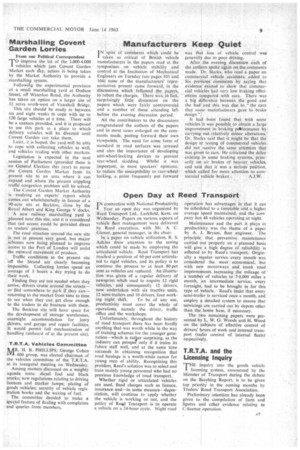Open Day at Reed Transport
Page 11

If you've noticed an error in this article please click here to report it so we can fix it.
IN connection with National Productivity 1 Year an open day was organized by Reed Transport Ltd., Larkfield, Kent. on Wednesday. Papers on various aspects of vehicle fleet management were delivered by Reed executives, with Mr. A. C. Glover, general manager. in the chair. In a paper on vehicle utilization, R. S. Adkins drew attention to the saving which could be made by employing the articulated vehicle. Reed Transport has reached a position of 60 per cent articulated to rigid vehicles, and its policy is to continue the process to at least 80 per cent as vehicles are replaced. An illustration was given of a regular delivery of newsprint whch used to require 12 rigid vehicles, and consequently 12 drivers, now undertaken with six tractive units, 12 semi-trailers and 70 drivers, four work ing night shift. To be of any use, productivity must cover the whole of operations, namely the driver, traffic office and the workshops. Unfortunately, throughout the history of road transport there has been hardly anything that was worth while in the way of training schemes for the younger generation—which is rater surprising, as the industry can prosper only if it trains its future staff well, and at the same time succeeds in obtaining recognition that road haulage is a worth-while career for young men of ability. Recognizing this problem, Reed's solution was to select and train mainly young personnel who had no previous knowledge of road transport. Whether rigid or articulated vehicles are used, fixed charges such as licence, insurance and—in some measure—depreciation, will continue to apply whether the vehicle is working or not, and the policy of Reckd Transport is to operate a vehicle on a 24-hour cycle. Night road operation has advantages in that it can be scheduled to a timetable and a higher average speed maintained, and the company has 48 vehicles operating at night. Maintenance and the part it plays in productivity was the theme of a paper by A. J. Bryant, fleet engineer. The principle that preventive. maintenance carried out properly on a planned basis will give a high degree of reliability is adhered to by Reed's transport. Originally a regular service every month was considered the most economical, but with new motorways and trunk road improvements increasing the mileage of a number of vehicles to 7-8,000 miles a month, an intermediate service, every fortnight, had to be brought in for this type of vehicle. Reed's insist that every semi-trailer is serviced once a month, and employ a detailed system to ensure that servieings are carried out by depots other than the home base, if necessary. The two remaining papers were presented by L. W. G. Woods and H. Wood on the subjects of effective control of drivers' hours of work and internal transport (radio control of internal fleets) respectively.
T.R.T.A. and the Licensing Inquiry
THE inquiry into the goods vehicle licensing system, announced by the Minister of Transport during the debate on the Beeching Report, is to be given top priority in the coming months by Traders' Road Transport Association. Preliminary attention has already been given to the compilation of facts and figures and other evidence relating to C-licence operation.
























































































































































